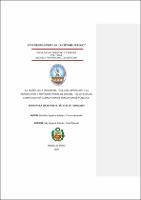| dc.contributor.advisor | Zegarra Arevalo Ronal Manuel | |
| dc.contributor.author | Aguilera Bolaños, Clever Alexander | |
| dc.creator | Aguilera Bolaños, Clever Alexander | |
| dc.date.accessioned | 2017-01-26T19:28:52Z | |
| dc.date.available | 2017-01-26T19:28:52Z | |
| dc.date.issued | 2017 | |
| dc.identifier | T_DER_312 | |
| dc.identifier.uri | https://hdl.handle.net/20.500.12759/2255 | |
| dc.description.abstract | El presente trabajo de investigación tiene como objetivo determinar de qué
manera la teoría de la unidad del título de imputación aplicada al momento de
calificar la autoría y participación en los delitos especiales se expresa en la
persecución y represión penal de los delitos cometidos por corrupción de
funcionarios públicos.
La recopilación de datos en cuanto a lo teórico debemos decir que utilizamos el
método dogmático y la técnica del fichaje para lo referente a la información
doctrinaria, y el método de interpretación auténtica para lo referente al estudio
normativo; en cuanto a la recopilación de datos de campo utilizamos el método
de análisis y síntesis y el instrumento de guía de registro de datos para el
acopio documental de toda la información relevante consignada en las carpetas
fiscales de la fiscalía especializada.
En cuanto a los resultados más importantes que hemos obtenido en nuestra
etapa de ejecución es que existe a la luz de los resultados de campo una
cultura de impunidad ya que todos los casos resueltos son por archivo y son
mínimos los casos de sentencia condenatoria para los infractores, el sustento
jurisprudencial y doctrinario de la aplicación de la teoría de la unidad del título
de imputación se basa en el principio de la accesoriedad limitada contenida en
el artículo 26 del CP, por lo cual se debería aplicar la teoría de la infracción de
deber donde se diferencia claramente la responsabilidad del intraneus y
extraneus.
La conclusión principal es que la teoría de la unidad del título de imputación
aplicada al momento de calificar la autoría y participación en los delitos
especiales se expresa de manera negativa en la persecución y represión penal
de los delitos cometidos por corrupción de funcionarios públicos, al fomentar la
impunidad de los agentes delictivos (intraneus y extraneus); por ello es
necesario modificar el artículo 26 en donde se asuma la teoría de infracción de
deber. | es_PE |
| dc.description.abstract | The present investigation aims to determine how the theory of the unity of the
title of imputation applied at the time of qualifying the authorship and
participation in the special crimes is expressed in the persecution and
repression of the criminal offenses committed by corruption of public officials.
The collection of data in regard to the theoretical we must say that we use the
dogmatic method and the technique of the chance to regard to the doctrinal
information, and the method of authentic interpretation with regard to normative
study; in regard to the collection of field data we use the method of analysis and
synthesis, and the instrument of registration guide data for the documentary
collection of all the relevant information contained in the tax folders of the
special prosecutor.
In regard to the most important results which we obtained in our implementation
phase is that there is in the light of ,the field results to a culture of impunity since
all the cases are resolved by file and to date there are no conviction for the
offenders, the livelihood law and doctrine of the application of the theory of the
unity of the title of imputation is based on the principle of the accessory
character limited contained in article 26 of the CP, so should apply the theory of
breach of duty where clearly the responsibility of intraneus and extraneus
differs.
The main conclusion is that the theory of the unit of the title of imputation
applied at the moment of qualifying the responsibility and participation in the
special crimes expresses itself in a negative way in the pursuit and penal
repression of the crimes committed by corruption of civil servants, on having
encouraged the impunity of the criminal agents (intraneus and extraneus); for it
is necessary to modify the article 26 where there is assumed the theory of
infraction of duty. | en_US |
| dc.description.uri | Tesis | es_PE |
| dc.format | application/pdf | es_PE |
| dc.language.iso | spa | es_PE |
| dc.publisher | Universidad Privada Antenor Orrego | es_PE |
| dc.relation.ispartofseries | T_DER_312 | |
| dc.rights | info:eu-repo/semantics/openAccess | es_PE |
| dc.rights.uri | https://creativecommons.org/licenses/by/4.0/ | es_PE |
| dc.source | Universidad Privada Antenor Orrego | es_PE |
| dc.source | Repositorio Institucional - UPAO | es_PE |
| dc.subject | Persecucion y Represion | es_PE |
| dc.subject | Corrupcion de Funcionarios Publicos | es_PE |
| dc.title | La teoría de la unidad del titulo de imputación y la persecución y represión penal de los delitos especiales cometidos por corrupción de funcionarios públicos | es_PE |
| dc.type | info:eu-repo/semantics/bachelorThesis | es_PE |
| thesis.degree.level | Título Profesional | es_PE |
| thesis.degree.grantor | Universidad Privada Antenor Orrego. Facultad de Derecho y Ciencias Politicas | es_PE |
| thesis.degree.name | Abogado | es_PE |
| thesis.degree.discipline | Derecho | es_PE |
| dc.subject.ocde | https://purl.org/pe-repo/ocde/ford#5.05.00 | es_PE |
| renati.type | https://purl.org/pe-repo/renati/type#tesis | es_PE |
| renati.level | https://purl.org/pe-repo/renati/level#tituloProfesional | es_PE |
| renati.discipline | 421016 | es_PE |
| dc.publisher.country | PE | es_PE |


